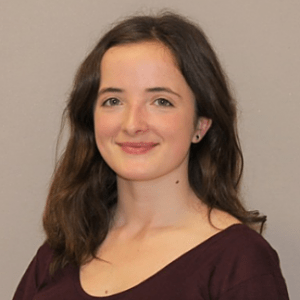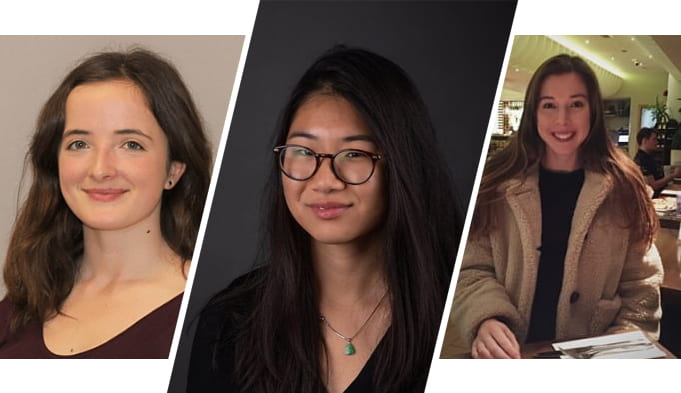Students for sustainability
Find out what inspired three of our undergraduates – Ellie Nelson-Coles and Helen Inman (Engineering Design) and Jade Low (Mechanical Engineering) – to study their subjects and help tackle global issues such as climate change and sustainability.
This year’s theme for International Women in Engineering Day is ‘Shape the World’. How do you think engineers will do that in the next decade?
Jade: The most long-term global problem is climate change. Solving that will involve renewable power generation, sustainable transport and food production and minimising carbon emissions produced during manufacturing. Carbon capture is an exciting prospect. It’s unlikely we’ll stop pollution overnight, but that could really help.
Ellie: My final year project is on vertical farming technology. It uses a nutrient mist rather than soil, needs less water yet produces more crops per square metre than traditional farming. It could change how we source our food. Growing things locally will reduce our carbon footprint and could alleviate food shortages.
Helen: I’m also working on vertical farming for my group design project. In partnership with LettUs Grow, I’m designing a modelling tool to identify the most efficient way to heat or cool spaces for growing plants, depending on a country’s temperatures and technologies.
Resources are being used up before they can regrow or be replaced. Engineering will be key if we want to improve quality of life without damaging the natural world. We’ll need to innovative, whether that’s better recycling, collecting ocean plastic or something no one has even considered yet.
How did you get into engineering in the first place?

Jade Low is president of Bristol’s Engineering without Borders student society. They promote sustainability by organising talks, trips, outreach activities, and events.
Ellie: I took a quiz at school that said my most suited career would be a design engineer. After researching all the things I could do with engineering, I realised it would be perfect as I love problem solving and teamwork.
Helen: I enjoyed A-levels physics and maths because you didn’t have to write too many essays. But the thought of doing a pure maths or physics degree terrified me, so I’m an engineer by default. This course offered a small cohort, a high percentage of women and an interesting city, important things when you’re 17. Now I’m here, I really appreciate the Industrial Liaison Office. It sets up internship interviews and partners you with interesting companies for your projects.
When you were a child, what was your favourite toy?

Jade: I couldn’t ever pick one but I used to have a robotic dog which I must confess terrified me slightly…
Ellie: Even aged three, it was my train set. If asked what I wanted for Christmas, I’d reply ‘a swing bridge for my trains’ rather than the doll or fairy outfit people expected. My mum loved that, almost as much as my brother’s favourite toy being one of my dolls.
Helen: Marble run! You could build your own route to race marbles down. My brother and I also had old orange plastic hot wheels tracks we would slot together and run from our bedrooms down the stairs into the kitchen.
Two of you have recently taken a year in industry, how did that go?
Ellie: I spent a year in the robotics and autonomous systems team at the Manufacturing Technology Centre in Coventry. I developed my programming and technical skills, worked with a range of staff and visited client sites to see production lines and present project work. Learning to conduct yourself in a professional environment helps prepare you for industry so I’d really recommend it.

Helen: I worked for a small start-up called Novel Engineering Consultants. The work was really varied and included lots of hands on tasks. We’d build test rigs in barns for complex components we’d designed on the computer weeks before. Being in research and development was really exciting.
Who are your engineering role models?
Jade: I’m inspired by Roma Agrawal, one of the structural engineers who worked on the Shard. I deeply admire her work to promote diversity in engineering. Her book, “Built” includes unsung female engineers such as Sophia, the sister of Isambard Kingdom Brunel. Also Katherine Goble, one of the first African-American women to work as a NASA scientist. Despite the racism and segregation she faced, she did incredible things like calculating the trajectory for the 1969 Apollo 11 flight to the moon.
Expand your knowledge
Ellie: Until recently, most famous engineers were male and from previous centuries, so it was hard to identify with them. But at a diversity in STEM event, lots of female engineers spoke about their careers. They’ve inspired me to have a successful, impactful career and become a role model for future female engineers.
Why is it important for society to have more women in engineering?
Jade: More diversity of thought in the workplace leads to better outcomes and more ideas. For engineering to provide the solutions it promises, we’d be unwise to exclude half the world’s population. More young girls need to be encouraged to join the profession – they are just as capable as their male counterparts.
Elle: We need to design for both genders not just one. For example, smartphones are made to fit the average man’s hand, voice recognition technology is twice as likely to recognise a male voice and men fare better in road accidents because crash dummies are based on a 70kg male! I’m on the Equality, Diversity and Inclusion Committee at the faculty. All genders, ages and nationalities are represented and we hope our ideas and opinions will help make the faculty a welcoming place for everyone.
Congratulations Helen!
 Helen was awarded a Royal Academy of Engineering Leadership scholarship last year. It recognises students with the potential to become leaders in engineering and future role models. She is one of 35 recipients of £5,000 for professional development. Helen is learning German and speaking in schools about taking an engineering degree.
Helen was awarded a Royal Academy of Engineering Leadership scholarship last year. It recognises students with the potential to become leaders in engineering and future role models. She is one of 35 recipients of £5,000 for professional development. Helen is learning German and speaking in schools about taking an engineering degree.


